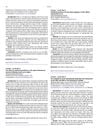 1 citations,
November 2023 in “iScience”
1 citations,
November 2023 in “iScience” A protein called desmoglein 3 is important for keeping hair follicle stem cells inactive and helps in their regeneration.
 3 citations,
November 2014 in “Protein Expression and Purification”
3 citations,
November 2014 in “Protein Expression and Purification” Scientists successfully purified a protein called Wnt3a, which is involved in processes like hair growth, but the overall yield was low, suggesting more work is needed to improve this.
3 citations,
January 2020 in “The journal of investigative dermatology/Journal of investigative dermatology” Skin cells from people with Epidermolysis Bullosa Simplex have abnormally placed and less active mitochondria.
 12 citations,
October 2017 in “Journal of Cosmetic Dermatology”
12 citations,
October 2017 in “Journal of Cosmetic Dermatology” Combining plasma rich in growth factors with hair transplant surgery may lead to faster recovery and better outcomes for hair loss treatment.
 93 citations,
November 2018 in “Carbohydrate Polymers”
93 citations,
November 2018 in “Carbohydrate Polymers” New nanocomposites with copper show promise for healing burn wounds and regenerating skin.
 21 citations,
June 2018 in “Current Opinion in Genetics & Development”
21 citations,
June 2018 in “Current Opinion in Genetics & Development” Scientists have made progress in growing mini-organs and regenerating parts of the skin, with plans to treat hair loss in a future trial.
 36 citations,
May 2016 in “Biomaterials”
36 citations,
May 2016 in “Biomaterials” Endo-HSE helps grow hair-like structures from human skin cells in the lab.
 January 2023 in “Journal of cosmetic dermatology”
January 2023 in “Journal of cosmetic dermatology” The synthetic retinoid EC23 thickens skin and promotes hair growth more effectively and with a lower dose than natural retinoids.
 2 citations,
July 2007 in “Cancer biology & therapy”
2 citations,
July 2007 in “Cancer biology & therapy” Bexxar is highly effective as a first treatment for non-Hodgkin's lymphoma, with most patients alive and many in remission after eight years.
 May 2024 in “Journal of molecular structure”
May 2024 in “Journal of molecular structure” A new compound, 3a, effectively fights prostate cancer better than finasteride.
December 2022 in “Nature Communications” Bead-jet printing of stem cells improves muscle and hair regeneration.
 November 2023 in “Periodontology 2000”
November 2023 in “Periodontology 2000” Injectable platelet-rich fibrin has improved healing and regeneration in various medical fields and can be more effective than previous treatments.
 June 2023 in “Frontiers in Bioengineering and Biotechnology”
June 2023 in “Frontiers in Bioengineering and Biotechnology” The conclusion is that accurately replicating the complexity of the extracellular matrix in the lab is crucial for creating realistic human tissue models.
 9 citations,
March 2023 in “Biomimetics”
9 citations,
March 2023 in “Biomimetics” New materials that better mimic natural skin structure could improve healing, especially for chronic wounds.
 1 citations,
March 2020 in “Journal of Pharmacological Sciences”
1 citations,
March 2020 in “Journal of Pharmacological Sciences” Benzothiazepines like diltiazem reduce anxiety in mice by making neurosteroids.
 October 2007 in “Journal of Investigative Dermatology”
October 2007 in “Journal of Investigative Dermatology” The document suggests a bacteria plays a significant role in acne rosacea and that white hair can regain color after transplant, meriting more research on reversing grey hair.
 23 citations,
December 2012 in “ChemistryOpen”
23 citations,
December 2012 in “ChemistryOpen” Probe detects finasteride with high selectivity and low detection limit.
 September 2011 in “Clinical Biochemistry”
September 2011 in “Clinical Biochemistry” Sodium metasilicate improved spinal motoneuron recovery after sciatic nerve injury in rats.
 October 2023 in “Biomedical science and engineering”
October 2023 in “Biomedical science and engineering” Innovative methods are reducing animal testing and improving biomedical research.

Elastin-like recombinamers show promise for better wound healing and skin regeneration.
 9 citations,
April 2019 in “International journal of molecular sciences”
9 citations,
April 2019 in “International journal of molecular sciences” Human hair grows better in a special gel that mimics skin.
 June 2022 in “Genetic engineering & biotechnology news”
June 2022 in “Genetic engineering & biotechnology news” A new hair loss treatment is being developed using reprogrammed stem cells to grow new hair follicles.

Plant-based compounds can improve wound dressings and skin medication delivery.
24 citations,
August 2021 in “Biologics” Stem cell therapy shows promise in improving burn wound healing.
 31 citations,
December 2014 in “Advances in Clinical and Experimental Medicine”
31 citations,
December 2014 in “Advances in Clinical and Experimental Medicine” Stem cells could improve plastic surgery but are not widely used due to cost and safety concerns.
 14 citations,
November 2020 in “International Journal of Molecular Sciences”
14 citations,
November 2020 in “International Journal of Molecular Sciences” Advanced therapies like gene, cell, and tissue engineering show promise for hair regrowth in alopecia, but their safety and effectiveness need more verification.
 2 citations,
December 2022 in “Journal of Biochemistry and Molecular Biology”
2 citations,
December 2022 in “Journal of Biochemistry and Molecular Biology” Organoids created from stem cells are used to model diseases, test drugs, and develop personalized and regenerative medicine.

Chemicals and stem cells combined have advanced regenerative medicine with few safety concerns, focusing on improving techniques and treatment effectiveness.
 12 citations,
September 2020 in “Stem cell research & therapy”
12 citations,
September 2020 in “Stem cell research & therapy” Adult skin cell-based early-stage skin substitutes improve wound healing and hair growth in mice.
1 citations,
April 2023 in “Scientific Reports” Self-assembling RADA16-I hydrogels with bioactive peptides significantly improve wound healing.

























